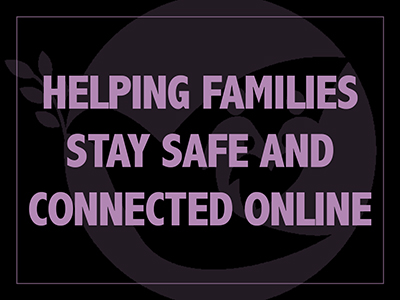Helping Families Stay Safe and Connected Online
With the COVID-19 pandemic keeping us physically distant from one another, we’ve all found new ways to connect virtually with the people and communities we’ve always depended on. This means many of us are spending more time than ever before online.
This can feel like tricky terrain for parents, as they watch their children log on daily for school, check in with friends over Zoom – perhaps even explore the world of social media for the first time. On one hand, the Internet has become a bit of a lifeline for families. On the other, without hovering over the screen, it’s hard to know exactly where children are going, what they’re seeing, and with whom they are speaking.
At Project S.A.R.A.H., New Jersey’s domestic violence and sexual abuse program for Jewish families, we know this isn’t a new issue. By some estimates, one in four children have experienced something upsetting on a social networking site, and one in three have been victim of a cyberbullying incident. Since developing its Internet and Cyber Bullying Prevention Workshop two years ago, Project S.A.R.A.H. presenters have brought this workshop to over 1,000 children in grades five through eight.
Although in-school Internet Safety Presentations are on hold for now, Project S.A.R.A.H.’s team of clinicians knows it’s more critical than ever to get the information out, so that parents can talk to their children about how to make smart choices online. The best way to start the dialogue is to listen. It’s not caregivers’ job to know everything about the internet–rather to hear with an open, curious mind about your child’s experience, and then offer guidance in ways that make them feel empowered.
Here are some points which you can discuss with your children. It’s normal for children to complain that they’re getting less freedom than their friends. You can show them that you hear and understand them, while continuing to communicate that it’s your job as a parent to keep them safe. Our hope is that it will help them make smarter choices while they are online.
A: Awareness- Remind your children that there are safe and unsafe places and people in our communities–that it’s important to know where you’re going, and to tell a trusted adult before venturing out. It’s critical to stress that same message about the internet’s world-wide electronically linked community. Talk with them about the fact that danger is much harder to spot online than it is when you walk down the street. Discuss with your children topics of catfishing and grooming, which describe the way predators target children, build their trust, and lure them into inappropriate relationships–sometimes disguised as a peer or someone of the same gender.
B: Be responsible. A great way to frame this conversation is through language of empowerment. Ask your children if they know that what they post online can never be completely erased. Do they want something they post today to become an embarrassing screen shot that keeps them from getting a babysitting job next year? You might consider sitting down with your child, researching privacy setting and parental control options together–then talking through the pros and cons of each.
C: Cyberbullying. Even if your children don’t use this term, chances are they’ve experienced it. They might have been a target, a bystander, or even (perhaps unknowingly) as the source of harassing texts, emailed rumors, or intimidating social media comments that, unlike face-to-face bullying, can feel inescapable. Rather than lecturing, you might ask for your child’s thoughts on how prevalent they think the issue is and how they would handle it if a friend were experiencing or participating in it.
D: Do tell. Offering your children a safe place to reflect on the pros and cons of exploring the internet provides an excellent foundation for the most important message of all: Tell a trusted adult if anything you see or experience online scares you, makes you feel uncomfortable, or seems unsafe. As much we all want children to be able to tell us everything, remind them that they have other options by working together on a list of other adults in the family, community, shul, or school with whom they can confide.
Expect the conversation around internet safety to be ongoing—one that evolves as your children grow, and as the online landscape continues to change. Know that it’s sometimes a child’s job to push boundaries and that it’s your job to listen, while enforcing rules you believe will best protect them.
Even during this time of social distancing, Project S.A.R.A.H. is hard at work helping families navigate these conversations through virtual psychotherapy sessions and preparing to resume classroom presentations once schools reopen. For more information, please call 973–777-7638 ext. 154, or visit us online at projectsarah.org, facebook.com or instagram.
By: Cara Harmon, LSW
Cara Harmon is a Project S.A.R.A.H. team member and presenter, and has worked extensively with those affected by domestic violence and other forms of trauma.




